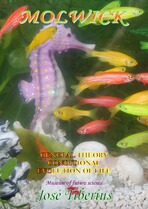5.b) CEL conclusions and characteristics
5.b.1. Main inferences of the general theory of evolution
Every theory of evolution is, at the same time, an opinion on the origin of life. However, some authors attempt to conceal it or avoid openly talking about the possible definition of life.
Chief conclusions from the basic formulation of the Conditioned Evolution of Life –CEL:
- Development
throughout life
Evolution is a consequence of the development of genetic information throughout the life of living beings.
Verification and complementarity
The relevant concepts for the species’ evolution are Logical Verification of Information and complementarity between two or more characters.
Sexual differentiation
Sexual differentiation implies the specialization of one sex ** in genetic evolution and the other in improving material technology for the new being.
Furthermore, it allows the transmission of a validated copy of the genetic information that guarantees the offspring's viability.
-
Improvement, feasibility, and optimization
Sexual differentiation 
Sexual differentiation contributes the most to the improvement, feasibility, and optimization of superior animals for allowing the Logical Verification of Information (LoVeInf) in various processes throughout their lives, with different mechanisms and degrees or variations of said method.
-
Gene expression and significance
The basic concepts of dominant and recessive genes of Mendel's law lose their meaning. If maintained, it is inappropriate except for characteristics of a discrete nature.
The so-called recessive gene is, in fact, the most powerful and modern when verification is a condition associated with the transmitted information. Therefore, the CEL changes its terminology, denominating significant genes to those restricting the expression of a particular process’ functions.
Vital impulse systems
The research methodology of the vital impulse systems may be useful for studying complex models.
The vital impulse denotes forces with an internal logic or intelligence at all levels of the system. Its origin cannot be delimited; in other words, the mystery of life, be it biological or of any nature.
The CEL distinguishes between logical or endogenous causes to any vital impulse system and external or environmental ones, such as natural selection or resource scarcity. Therefore, it allows a more detailed analysis of the various evolutionary stages.
5.b.2. Characteristics of the CEL
-
A scientific theory of evolution
The EDI Study (2002) confirms the most important forecasts of the Conditioned Evolution of Life –CEL.
Subsequently, an additional hypothesis of sexual selection in The EDI Study gave positive results.
Many experiments also provide evidence that perfectly fits the CEL, such as duplicating the rice genome and those cited in the section on empirical evidence.
- A philosophical and scientific theory
Every theory has its more or less visible philosophical substrate. In this case, the scientific and philosophical duality of CEL is explicit, paying particular attention to the proper separation and independence of its scientific implications and proposing methods of contrasting them.
The formulation tries to express the basic principles of man's evolution, the origin of life, and development in general.
Orthogenetic and teleological theory
It is teleological for assigning the goal of widening the sphere of freedom. It is Orthogenetic for admitting internal factors.
We were aware of this philosophical postulate while formulating the theory, but those characteristics are essential, helpful, and pretty. Nevertheless, from a scientific point of view is relatively irrelevant to amplify freedom or not. We say relative because, if their consequences are real, it would be logical to accept the principles inspiring it, as long as a more consistent explanation appears.
General theory
Its formulation tries to express the general principles of the origin of life and its development. It even goes a step forward, thinking that the same principles could apply to any evolutionary system with vital impulse.
It does not deny the established theories; quite the contrary, it incorporates them through the third basic idea mentioned in its definition as particular cases.
Genetic modifications in most superior evolutionary processes due to environmental influences, random elements, trial and error processes, changes already verified, sexual differentiation, and natural and sexual selection will be present.
Continuant and revolutionary theory
The CEL is continuant because it incorporates Lamarck, Darwin, and Mendel's contributions, and some regularly ignored trends opposed to natural selection as the leading cause of evolution. Besides, it develops, combines, and modernizes concepts according to the new contributions of advances in science and current culture.
It is a revolutionary theory because its outcomes imply a qualitative change in life's concept and origin. In any case, evolutionary leaps are similar to a new building higher than the old ones and need additional pillars and more advanced general knowledge.
Scientific theory of flying 
Intuitive and complex systems theory
The CEL uses the hypothetic-deductive or validation of hypotheses method. It is typical for modifying previous theories about complex systems, and intuition is a substantial source of their suggestions.
The same methodology can be useful to other branches of knowledge studying complex systems that resemble the vital impulse systems.
- Multidisciplinary theory
The subject studied depends on and affects a large number of disciplines of knowledge.
